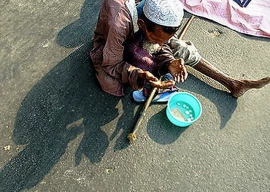
WASHINGTON: Just days before this weekend's Nato summit, the United States remains short of its goal of raising $1.3 billion in security funds from its partners in Afghanistan, after a money-raising blitz failed to garner immediate contributions from allies facing fiscal and political pressures.
Who will pay for Afghanistan's future security will be central when President Barack Obama hosts leaders from Nato and other nations in his hometown of Chicago for the two-day summit starting on Sunday that will outline the Western path out of the long war.
"There was some hope that the kitty would be full by Chicago. That may not happen but it doesn't mean we won't achieve that goal in the future," a US official said.
"We expect a number of countries to pony up, and that's a sign of progress toward sustaining (Afghan forces) in the years to come," the official said.
Going into the weekend, the United States remains $300 million to $500 million short of that goal. Western nations, grappling with fiscal crisis and mindful of dwindling support for the war, are eager to chart a course out of Afghanistan, even as the Taliban continues to pose a serious threat to the weak, corrupt Afghan government.
Afghanistan's growing national police and army are at the core of Nato's strategy for removing most foreign troops by the end of 2014 without triggering the collapse of its Western-backed government. Keeping those forces armed and fighting in a country still heavily reliant on outside aid will cost an estimated $4 billion a year. To supplement American assistance, the Obama administration is asking its allies to provide $1.3 billion of that annually.
Nato Secretary General Anders Fogh Rasmussen, speaking in Brussels last month, said Chicago would not be a "pledging conference."
But officials in Washington had hoped privately to secure those commitments before the summit, which is seen as an opportunity for Obama to brandish his foreign policy achievements before the November election. With other earlier goals for Chicago on hold - such as a once-hoped-for breakthrough in initial peace talks with the Taliban - a strong outside commitment to funding Afghan forces takes on more importance for Nato leaders at the summit.
Public and private pledges
Pledges made publicly and privately toward the goal now amount to $800 million to $1 billion. Of that Britain, Germany, and Australia have announced annual support for Afghan forces worth about $400 million combined. In addition, the Afghan government has committed $500 million a year.
A Nato official told reporters in Kabul this week the alliance "hopes" the $4.1 billion total goal can be met in Chicago.
While more support may be unveiled in the coming days, not all nations the United States has tapped have been ready to step forward. France, whose new president, Francois Hollande, has promised to accelerate the French departure from Afghanistan, is not expected to make a commitment at Chicago.
"Financial commitments cannot be made here," a French diplomatic source said. "The US in some ways underestimated the complexity of the decision-making process in other capitals" in its push to raise that money, one Western diplomat said on condition of anonymity. "Although most ISAF members agree properly funding (Afghan forces) is critical, in the current fiscal and political climate, any new funding commitment is subject to an extensive debate. This meant it took longer to raise the funds than the US anticipated," the diplomat said.
Obama dispatched his special representative for Afghanistan and Pakistan, Marc Grossman, to European capitals this spring to press for commitments. But funding requests may have not been made to countries early enough.
"The economic problems in Europe and the United States, combined with the continued concerns about corruption inside of Afghanistan, makes it an uphill battle to get countries to make long-term commitments on funding for Afghanistan," said Brian Katulis, a senior fellow at the Center for American Progress.
Japan, another important ally that will host a conference on aid to Afghanistan this summer, has not yet come forward. Neither have Gulf allies Saudi Arabia and Qatar. Although the scenarios under consideration would cost the United States far less than it now spends in Afghanistan, the Obama administration itself will not be immune to pushback from skeptical US lawmakers, Katulis said.
In New York, the UN special envoy to Afghanistan, Jan Kubis, said a clear commitment was needed from countries at the Nato summit, "not words, not political pledges, not messages." "If the countries will fail to support Afghanistan, (then) in five, 10 years from now ... we might have a very nasty situation coming back," he told Reuters. "We don't want to have once again a restart of everything because it will be a lost investment ... including lives lost in vain."
The US official said funding goals were expected to be met eventually. "Everyone understands the stakes," the official said. "It would be a serious mistake to abandon Afghanistan like it was abandoned in 1989. We have a responsibility to support (Afghan forces)."
About 3,000 foreign soldiers have died in Afghanistan since the war began after the Sept. 11, 2001 attacks.
COMMENTS (2)
Comments are moderated and generally will be posted if they are on-topic and not abusive.
For more information, please see our Comments FAQ



































































As noted with Pakistan -- giving enormous sums of money to corrupt officials doesn't provide benefits to the people, doesn't improve your image, and is pretty much like throwing money out a window.
No amount of any magnitude can compensate Afghanistan for the country wide destruction let loose by the US and NATO forces during the last 10 years.